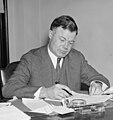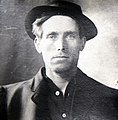Portal:Organized Labour

Introduction

- In trade unions, workers campaign for higher wages, better working conditions and fair treatment from their employers, and through the implementation of labour laws, from their governments. They do this through collective bargaining, sectoral bargaining, and when needed, strike action. In some countries, co-determination gives representatives of workers seats on the board of directors of their employers.
- Political parties representing the interests of workers campaign for labour rights, social security and the welfare state. They are usually called a labour party (in English-speaking countries), a social democratic party (in Germanic countries), a socialist party (in Romance countries), or sometimes a workers' party.
- Though historically less prominent, the cooperative movement campaigns to replace capitalist ownership of the economy with worker cooperatives, consumer cooperatives, and other types of cooperative ownership. This is related to the concept of economic democracy.
The labour movement developed as a response to capitalism and the Industrial Revolution of the late 18th and early 19th centuries, at about the same time as socialism. The early goals of the movement were the right to unionise, the right to vote, democracy and the 40-hour week. As these were achieved in many of the advanced economies of western Europe and north America in the early decades of the 20th century, the labour movement expanded to issues of welfare and social insurance, wealth distribution and income distribution, public services like health care and education, social housing and common ownership. (Full article...)
Selected article
James Riddle Hoffa (born February 14, 1913 – disappeared July 30, 1975, declared dead July 30, 1982) was an American labor union leader who served as the president of the International Brotherhood of Teamsters (IBT) from 1957 until 1971.
From an early age, Hoffa was a union activist, and he became an important regional figure with the IBT by his mid-20s. By 1952, he was the national vice-president of the IBT and between 1957 and 1971 he was its general president. He secured the first national agreement for teamsters' rates in 1964 with the National Master Freight Agreement. He played a major role in the growth and the development of the union, which eventually became the largest by membership in the United States, with over 2.3 million members at its peak, during his terms as its leader.
Hoffa became involved with organized crime from the early years of his Teamsters work, a connection that continued until his disappearance in 1975. He was convicted of jury tampering, attempted bribery, conspiracy, and mail and wire fraud in 1964 in two separate trials. He was imprisoned in 1967 and sentenced to 13 years. In mid-1971, he resigned as president of the union as part of a commutation agreement with U.S. president Richard Nixon and was released later that year, but he was barred from union activities until 1980. Hoping to regain support and to return to IBT leadership, he unsuccessfully tried to overturn the order. (Full article...)May in Labor History
Significant dates in labour history.
- May 01 - In 1884 Proclamation of the demand for eight-hour workday in the United States. Two years later, in 1886, the general strike which eventually won the eight-hour workday in the United States, began. These events are today commemorated as May Day or Labor Day in most industrialized countries; Thomas Lewis died; the 1946 Pilbara strike occurred in Australia; International Woodworkers of America merged with the International Association of Machinists; Mike Watson was born; the Taksim Square massacre occurred in Turkey in 1977
- May 02 - Nazi Germany outlawed free trade unions and established the German Labour Front; Bernice Fisher died
- May 03 - The International Typographical Union was founded; the Bay View Tragedy occurred in 1886 in the U.S.
- May 04 - Haymarket Riot occurred in 1886 in the U.S.
- May 05 - John Sweeney was born; Jackie Presser stepped down as Teamsters president due to cancer; James Duncan was born
- May 06 - Miguel Contreras died; Frank Fitzsimmons died; Ludvik Buland was born
- May 07 - Miguel Contreras was born; Maurice Hutcheson was born; David Sullivan was born
- May 08 - Jerome Wurf was born; the Hard Hat riot occurred in the U.S. in 1970
- May 09 - Elias Motsoaledi died; 1934 West Coast Waterfront Strike began in the U.S.
- May 10 - Isaac Theophilus Akunna Wallace-Johnson died; Walter Philip Reuther died; the 2008 Skorpion Zinc Strike began in Namibia
- May 11 - William Konyha was born; Pullman Strike began in 1894 in the U.S.
- May 12 - Coal Strike of 1902 began in the U.S.; the American Maritime Officers was founded
- May 13 - Henk Sneevliet was born
- May 14 - Arthur Moore (labor leader) was born; the Ådalen shootings occurred in Sweden in 1931
- May 15 - Pope Leo XIII issued Rerum Novarum; Winnipeg General Strike of 1919 began; George Mock stepped down as president of the Teamsters after eight days; the Ulster Workers' Council Strike began in 1974 in Northern Ireland; the U.S. Supreme Court decided Gompers v. Buck's Stove and Range Co.; Arthur Creech Jones was born
- May 16 - The Minneapolis General Strike of 1934 began in the U.S.; the Iraqi Federation of Trade Unions was founded; the U.S. Supreme Court decided NLRB v. Mackay Radio & Telegraph Co.; A. Philip Randolph died
- May 17 - The first Starbucks Workers Union was organized; former trade union leader Francisco Largo Caballero was deposed as prime minister of Spain
- May 18 - Bill Haywood died; the Atlanta transit strike of 1950 began in the U.S.
- May 19 - James P. Hoffa was born; the Battle of Matewan began in 1920 in the U.S.
- May 21 - Cyrus S. Ching was born
- May 22 - Agustín Tosco was born; the Steel Workers Organizing Committee was disbanded in 1942; the United Steel Workers of America was founded in 1942
- May 23 - The "Battle of Toledo" occurred during the Auto-Lite Strike in 1934 in the U.S.
- May 24 - The Pennsylvania Association of Staff Nurses and Allied Professionals was founded; Peter J. Brennan was born
- May 25 - Philip Murray was born; the Remington Rand strike of 1936–1937 began in the U.S.; Basdeo Panday was born; Will H. Daly was born
- May 26 - Actors' Equity Association was founded; the Ohio Federation of Teachers was founded
- May 27 - The U.S. Supreme Court decided In re Debs
- May 29 - The Disney animators' strike began in 1941 in the U.S.; the Cordobazo uprising began in 1969 in Argentina; the 2006 TTC wildcat strike began in Canada
- May 30 - William Sidell was born; the Memorial Day massacre of 1937 occurred in the U.S.; the U.S. Supreme Court decided Lehnert v. Ferris Faculty Association
- May 31 - W. A. Boyle died
More Did you know (auto-generated)
- ... that when journalist and trade unionist Nisn Pups was released from jail, the Communist Party of Lithuania instructed him to change his name?
- ... that during the Venezuelan general strike of 2002–2003, all but one of Venezuelan chocolatier María Fernanda Di Giacobbe's ten businesses went bankrupt?
- ... that the opening day of a California TV station was affected by a strike when workers refused to cross a two-man picket line?
- ... that after Kellogg's announced plans to replace striking workers in 2021, members of r/antiwork organized to submit fake applications to the company's hiring system?
- ... that a 1994 lightning strike in Egypt led to 469 deaths after oil tanks were ignited and flooded the village of Dronka with burning fuel?
- ... that the day after returning to Atlanta following his Nobel Peace Prize acceptance in 1964, Martin Luther King Jr. joined picketers who were on strike against Scripto?
Related Portals
Selected image
Selected Quote
Ten thousand times has the labor movement stumbled and bruised itself. We have been enjoined by the courts, assaulted by thugs, charged by the militia, traduced by the press, frowned upon in public opinion, and deceived by politicians. But notwithstanding all this and all these, labor is today the most vital and potential power this planet has ever known, and its historic mission is as certain of ultimate realization as is the setting of the sun."
|
— Eugene V. Debs. |
Did you know
- ...that the Jiu Valley miners' strike of 1977 was the largest protest movement against the Communist regime in Romania before the Romanian Revolution of 1989?
- ...that the West End Street Railway fired Cyrus S. Ching in 1901 after he was nearly electrocuted on the job, only to appoint him manager two months later?
- ...that the Occupational Safety and Health Act went into effect in the United States on April 28, 1971, the same day as Workers' Memorial Day?
Topics
Get involved
Associated Wikimedia
The following Wikimedia Foundation sister projects provide more on this subject:
-
Commons
Free media repository -
Wikibooks
Free textbooks and manuals -
Wikidata
Free knowledge base -
Wikinews
Free-content news -
Wikiquote
Collection of quotations -
Wikisource
Free-content library -
Wikiversity
Free learning tools -
Wiktionary
Dictionary and thesaurus

















































































